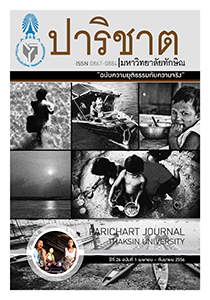ความยุติธรรมตามตัวอักษร : ความเป็นธรรมตามความเป็นจริง
Main Article Content
Abstract
สังคมไทยมีปัญหาความเหลื่อมล้ำด้านที่ดินสูงมาก จากข้อมูลพบว่า ที่ดินทำประโยชน์ 90% กระจุกตัวอยู่ในมือของคนรวยร้อยละ 10 ขณะที่ ประชากรร้อยละ 90 ถือครองที่ดินเพียง 10% เท่านั้น ด้านการถือครองที่ดิน ประชาชนมีปัญหาที่ดิน 2.22 ล้านราย เป็นผู้ไม่มีที่ดินทำกินราว 8.8 แสนราย มีที่ดินแต่ไม่มีทำกิน 5.2 แสนราย ในขณะเดียวกันมีที่ดินที่ถูกทิ้งร้างอยู่ถึง 48 ล้านไร่ เพื่อรอการเก็งกำไร นอกจากนี้ยังทราบว่ามีผู้อาศัยทำกินในที่ดิน ของรัฐ 1.1 ล้านราย พื้นที่ราว 21 ล้านไร่ มีที่ดินเกษตรกรราว 39 ล้านไร่ เข้าสู่กระบวนการฟ้องร้องเพื่อขายทอดตลาดถูกฟ้องร้องไล่ที่รื้อถอนสิ่งปลูกสร้าง ถูกจำคุกและชำระค่าเสียหายและถูกคุมขังอยู่ในคุก ทั้งนี้จากการวิจัย การไป เยี่ยมเยือนพื้นที่ และได้พบปะกับผู้ที่แพ้คดี ถูกจองจำ ถูกสั่งให้ออกจากพื้นที่ และจ่ายค่าเสียหาย 5 กรณีประกอบด้วย กรณีปัญหาที่ดินจังหวัดอุบลราชธานี กรณีปัญหาที่ดินชาวเลหาดราไวย์ จังหวัดภูเก็ต กรณีสวนป่าคอนสาร จังหวัดชัยภูมิ กรณีที่ดินชุมชนทับยาง จังหวัดพังงา และกรณีหนองปลาสวาย จังหวัดลำพูน พบว่าพวกเขาแสดงความรู้สึกว่าไม่ได้รับความเป็นธรรมจาก กระบวนการยุติธรรม ไม่ว่าจะเป็น (1) การออกเอกสารสิทธิ์และการเพิกถอน (2) ปัญหาภาระในการนำสืบเพื่อพิสูจน์ (Burden of Proof) และน้ำหนักของ หลักฐานในการพิจารณาของศาล (3) ระบบกล่าวหาหรือระบบไต่สวน (4) การ ไม่รับรองสิทธิชุมชนตามรัฐธรรมนูญ และ (5) ความเหลื่อมล้ำในสังคม : ความเท่าเทียมในศาลยุติธรรม
ทั้งนี้ประชาชนคิดว่าศาลเป็นสถาบันที่ทรงคุณธรรม เป็นสถาบันสูงสุด เป็นที่พึ่งสุดท้ายแห่งเดียวที่สามารถช่วยแก้ไขปัญหาความไม่เป็นธรรมให้แก่ ประชาชนได้ แต่ต้องสร้างกระบวนการที่จะทำให้ยุติธรรมบังเกิดและเป็นธรรม กับประชาชนจริง
AKIN RAPEEPAT
The problem of inequality in land distribution seem to be a serious problem in Thai Society, According to the information found that wealthy person (10%) possess land around 90% whereas grass-root people (90%) have ownership of their lands only 10%. People face problem of having ownership of lands in number of 2.22 million which can divide as follow; Eight hundred and eighty thousand people do not hold title over their lands and Five hundred and twenty thousand people have ownership on their land but do have money to use of their lands Moreover, the information revealed that there are waste-lands around 48 million Rai in order to speculate a price of land and living in land states area around 1.1 million people (approximately area 21 Rai). There are agricultural areas around 39 Rai enter into auction process. Furthermore, farmers also face with several difficulties for example, the problem of eviction and demolish areas of their building, the problem of sentence by court together with fine for their wrong doing etc.
The researcher tried to conduct some field -study researches and interviewed with some victims who received a prison sentence as well as some were ordered by court to leave out of their lands and were fined where happened in five areas include 1. The land-area problem in Ubonrattathani province 2. The land-area problem of Sea Gypsy in Rawai beach Phuket province 3.The problem of Sarkorn land-forest in Chaiyaphum province 4.The land-area problem in Thapyang chumchon phangnga province and 5. The problem of Nong Pla Sawai in Lumpoon province. The results of researches in five cases - study areas found that all victims complained they could not excess fair trial from judicial system. Such as 1. Issuing and withdrawing of land certificate 2. Burden of Proof‘s problem and weight of evidence 3. Accusatorial system and Inquisitorial system 4. Non-acceptance of community right 5. Inequality in social system: fairness in court of justice. Court institution is very important because people hope and realize that court institution is a place that can eradicate unfairness and can create equality to Thai society.


